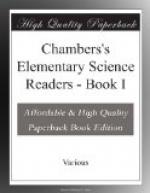THE MOUSE.
an’-i-mal noise mouse cheese har’-vest stalk should four tail nib’-ble young beasts squeak hours leaves catch
1. Harry came running in one day to say that he had seen a little animal in the field.
2. ’It ran so fast, I could hardly see it. I looked a long time for it, and so did Dora, but we could not find it. Now, what do you think it could be, mother?’
[Illustration]
3. Then in came Dora, ’It had a long tail, and was very little, and made no noise at all.’
4. ‘It may have been a mouse,’ said their mother; ‘very likely it was.’
’But mice live indoors, do they not, and eat cheese, and run about in the walls, and make holes?’
5. ‘How do you know all this?’
‘I have heard them at grandmother’s,’ said Harry. ’Do they ever live out of doors?’
6. ’A good many do. There is a pretty little thing called a harvest-mouse. It makes a nest like a bird’s, and hangs it up on a stalk of wheat.’
[Illustration: The Harvest Mouse and Nest.]
7. ‘I wish there had been one in our wheat!’ said Dora. ’I should like to see the little nest and the baby-mice peeping out. They must be very, very small.’
8. ’Yes, the harvest-mouse is the very smallest four-footed animal we have. Then there is a field-mouse with a long tail, and a field-mouse with a short tail. Mr Short-tail likes to nibble at young trees.’
‘Ah, that is not our mouse! He had a long tail.’
9. ‘And then there is a wood-mouse.’
‘Has he a short tail or long tail?’ asked Harry.
’Long. I must tell you about a man who used to go out in the night in wild places to see what birds and beasts were doing when most of us were in bed.
10. ‘One of the things he found out was that field-mice could sing!’
‘Don’t they squeak?’
’Yes; and he often heard them go on for hours making a kind of singing.
11. ’Sometimes they were close by him as he lay on the ground, and he would put out his hand to catch one. But when he opened it again it was full of grass or moss or leaves; and there was no mouse.’
‘Did he never catch one?’
‘Never.’
THE FIELD-MOUSE.
tum’-bles ber’-ry brown mer’-ry scarce’-ly weath’-er nib’-bling fruits farm’-er stacks treas’-ure pleas’-ure reared’ un-der-neath’ shad’-ow mead’-ow
1. Where the acorn tumbles
down,
Where
the ash-tree sheds its berry,
With
your fur so soft and brown,
With
your eyes so soft and merry,
Scarcely
moving the long grass,
Field-mouse,
I can see you pass.
2. Little thing, in
what dark den,
Lie
you all the winter sleeping,
Till
warm weather comes again?
Then
once more I see you peeping
Round
about the tall tree roots,
Nibbling
at their fallen fruits.




